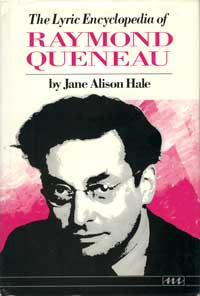
Jane Alison Hale
University of Michigan Press, 1989.
This is a scholarly appreciation of one of the most remarkable writers of the 20th century. Queneau (1903-1976) was a poet and novelist who became director of the Encyclopédie Pléiade, and co-founded the OULIPO literary workshop.
One of the distinguishing features of Queneau as a writer and literary scholar was his abiding interest in mathematics and science. Although his humour, playfulness and forward-looking views led him briefly to become a member of the Surrealist movement in the 1920s, he could never be reconciled with their rejection of reason and scientific knowledge in favour of the caprices of the unconscious.
Queneau himself made contributions to the field of mathematics called combinatorics, but it is more than his curiosity or sympathy with science which leads Hale to describe him as a lyric encyclopaedist. The investigation and application of mathematical form pervades and in-forms both the novels and poetry of Queneau, yet, in such a personal and imaginative way that his work is a shining example of how an artist can work towards the unification of human experience and knowledge through a poetic transformation of materials.
This synthesizing project is a profoundly inspiring effort that dares to tangle with abstract concepts while seeking expression in an enormous linguistic register and in forms ranging from the traditional sonnet to experimental structures of his own devising.
Two major examples of this are the "Cent Mille Milliard de Poèmes", a book of 10 sonnets each of whose 14 lines is on a separate strip, enabling 100 000 000 000 000 (or 1014) different poems to be read. The other is "Exercises de Style", whose simple story is told in 99 different ways, from zoological terminology to backslang.
Key themes explored by Hale are language and laughter, leading, not surprisingly, to comparisons with Joyce and Beckett. She also aligns Queneau with his great literary ancestor Rabelais, who "attempted, and achieved, a poetic modification of his complex world through his use of folk carnival humour and verbal comedy".
© Paul Taylor 2001